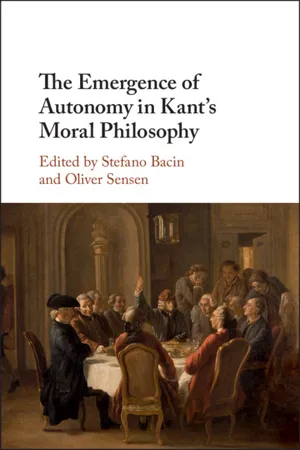
- English
- PDF
- Available on iOS & Android
The Emergence of Autonomy in Kant's Moral Philosophy
About This Book
Autonomy is one of the central concepts of contemporary moral thought, and Kant is often credited with being the inventor of individual moral autonomy. But how and why did Kant develop this notion? The Emergence of Autonomy in Kant's Moral Philosophy is the first essay collection exclusively devoted to this topic. It traces the emergence of autonomy from Kant's earliest writings to the changes that he made to the concept in his mature works. The essays offer a close historical and philosophical analysis of what prompted Kant to develop his conception of autonomy, charting the historical background which prompted his search, and thoroughly analysing different stages of his writings in order to see which element of autonomy was introduced at which point. The resulting volume will be of interest to both scholars and students of Kantian moral philosophy, as well as to anyone interested in the subject of autonomy.
Frequently asked questions
Information
Table of contents
- Cover
- Half-title
- Title page
- Copyright information
- Contents
- Contributors
- Acknowledgments
- Abbreviations and Translations
- Introduction
- Chapter 1 How Is Moral Obligation Possible?: Kant’s ‘‘Principle of Autonomy’’ in Historical Context
- Chapter 2 Anticipations of Autonomy: Freedom, Obligation, and the Concept of a World in Kant’s Writings of the Mid-1750s to Mid-1760s
- Chapter 3 Autonomy and Moral Rationalism: Kant’s Criticisms of ‘‘Rationalist’’ Moral Principles (1762–1785)
- Chapter 4 Autonomy and Moral Empiricism: Kant’s Criticism of Sentimentalist Moral Principles (1762–1785)
- Chapter 5 Elements of Autonomy in Kant’s Lectures on Ethics (1770–1780)
- Chapter 6 Emerging Autonomy: Dealing with the Inadequacies of the ‘‘Canon’’ of the Critique of Pure Reason (1781)
- Chapter 7 Autonomy and the Legislation of Laws in the Prolegomena (1783)
- Chapter 8 How Can Freedom Be a Law to Itself?: The Concept of Autonomy in the ‘‘Introduction’’ to the Naturrecht Feyerabend Lecture Notes (1784)
- Chapter 9 Moral Autonomy as Political Analogy: Self-Legislation in Kant’s Groundwork and the Feyerabend Lectures on Natural Law (1784)
- Chapter 10 What Emerged: Autonomy and Heteronomy in the Groundwork and Second Critique
- Chapter 11 Kant’s Threefold Autonomy after the Groundwork: Reason’s Own Lawgiving as Our Own Cosmopolitan Lawgiving
- References
- Index